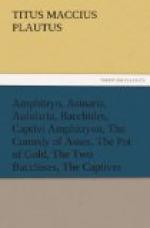The original of the Captivi is quite unknown, while the war between the Aetolians and Eleans gives the only clue to the date of this original. Hueffner[13] considers it probable that the war was that between Aristodemus and Alexander, and the Greek play was produced shortly after 314 B.C. Others[14] assume that the scene of the play would not be Aetolia unless Aetolia had become an important state, and that the war was therefore one of the third century B.C.
[Footnote 1: See especially Hueffner, De Plauti Comoediarum Exemplis Atticis, Goettingen, 1894; Legrand, Daos, Paris, 1910, English translation by James Loeb under title The New Greek Comedy, William Heinemann, 1916; Leo, Plautinische Forschungen, Berlin, 1912.]
[Footnote 2: Amph. 203 seq.]
[Footnote 3: Produced later than the Epidicus. Cf. Bacch. 214.]
[Footnote 4: Amphitruo, Thebes, Captivi, Aetolia, Cistellaria, Sicyon, Curculio, Epidaurus (the Caria first referred to in v. 67 was a Greek town, not the state in Asia Minor), Menaechmi, Epidamnus.]
[Footnote 5: Asin. Prol. 10-11.]
[Footnote 6: Asin. 713.]
[Footnote 7: Asin. 334.]
[Footnote 8: Asin. 499.]
[Footnote 9: Aulul. 299, 301.]
[Footnote 10: Aulul. 504.]
[Footnote 11: Ritschl, Parerga,
pp. 405 seq. Cf. Menander,
Fragments, 125, 126.]
[Footnote 12: Bacch. 912.]
[Footnote 13: Hueffner, op. cit. pp. 41-42.]
[Footnote 14: Cf. Legrand, op. cit. p. 18.]
INTRODUCTION
Little is known of the life of Titus Maccius Plautus. He was born about 255 B.C. at Sarsina, in Umbria; it is said that he went to Rome at an early age, worked at a theatre, saved some money, lost it in a mercantile venture, returned to Rome penniless, got employment in a mill and wrote, during his leisure hours, three plays. These three plays were followed by many more than the twenty extant, most of them written, it would seem, in the latter half of his life, and all of them adapted from the comedies of various Greek dramatists, chiefly of the New Comedy.[15] Adaptations rather than translations they certainly were. Apart from the many allusions in his comedies to customs and conditions distinctly Roman, there is evidence enough in Plautus’s language and style that he was not a close translator. Modern translators who have struggled vainly to reproduce faithfully in their own tongues, even in prose, the countless puns and quips, the incessant alliteration and assonance in the Latin lines, would be the last to admit that Plautus, writing so much, writing in verse, and writing with such careless, jovial, exuberant ease, was nothing but a translator in the narrow sense of the term.




